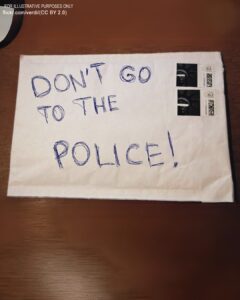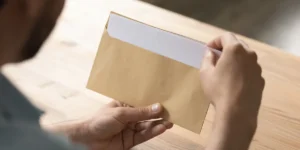
When I first moved into my new neighborhood a few months ago, I was thrilled with the peaceful charm of the area. My job as a designer had me working long hours, but I found solace in the quiet neighborhood and its friendly inhabitants—except for my elderly neighbor, Ruth.
Ruth, a woman in her mid-60s, lived alone next door. She rarely ventured outside except for essentials like grocery shopping or medical appointments. Her reclusive nature was a bit peculiar, but I respected her privacy and didn’t push.
One day, as I was sorting through my mail, I found an envelope that stood out from the usual bills and junk. It was handwritten and seemed oddly out of place. Without thinking, I opened it and began to read. The content was shocking and alarming.
The letter began:
“MOM! THEY’RE STILL HOLDING ME. JUST KNOW THAT EVERYONE’S LYING AND I’M ALIVE! BUT WHATEVER HAPPENS, DON’T GO TO THE POLICE BECAUSE…”
My heart raced as I continued reading. The letter’s tone was frantic and desperate. It mentioned something about not trusting anyone and asked Ruth to leave a response in her mailbox. The urgency and fear in the letter were palpable.

Feeling a rush of panic and guilt for reading someone else’s mail, I initially thought it might be a prank or a cruel joke. But the content was so distressing that I decided to call the police. I provided them with the letter and explained how it had mistakenly ended up in my mailbox.
The police arrived quickly and read the letter. They decided to set up surveillance to see who would come to collect Ruth’s response. They instructed me to stay indoors while they handled the situation. As night fell, I heard the police making an arrest outside. They apprehended a young man who appeared disheveled and nervous.
The next morning, the police updated both Ruth and me. The young man was a distant relative of Ruth’s, someone she hadn’t seen in years. He had been sending these letters to Ruth, pretending to be her deceased son, in a twisted attempt to gain control over her house.
Ruth’s son had tragically died in a car accident years ago, and his body was never recovered. Ruth had been clinging to the hope that he might still be alive. The young man exploited this hope to manipulate and deceive her.
After the police left, I decided to visit Ruth. She opened the door, her eyes red from crying. I expressed my sympathy and offered my support. Ruth, initially hesitant, eventually welcomed me inside. We spent time talking, sharing stories, and sipping tea. Ruth opened up about her son, sharing precious memories that had been overshadowed by the grief of his loss.
I learned that Ruth had actually been away visiting a friend when I found the letter and had only returned that morning. The police intervention had come as a shock to her.
Before I left, I gave Ruth my phone number and told her she could call me anytime. Her gratitude was palpable, and she thanked me for my actions. She even mentioned that she thought her son would have liked me.
Walking back to my house, I reflected on the experience. It reminded me of the importance of kindness and human connection. Even in the smallest acts, like reading a letter that wasn’t meant for me and reaching out to a neighbor, there’s the potential to make a profound impact.
In the end, Ruth and I developed a bond through that unexpected turn of events, and I realized that sometimes, stepping out of our comfort zones can lead to meaningful connections and understanding.
Leave a Reply